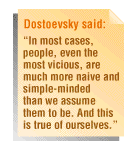
Why Influence?
Everyday
Modern
Definitions
# of Tactics?
16 Tactics
53 Tactics
Ethics I
Ethics II
Disciplines
Approach
Bad Info
Structure
Mindfulness
Mindlessness
Matrix
Bibliography
Classwork
Links
 Here's a great experiment that
demonstrates mindlessness:
Here's a great experiment that
demonstrates mindlessness:
Ellen Langer conducted the following brilliant, fascinating study. She conspired with her university librarian to shut down all but one of the photocopy machines in a busy wing of the library. This quickly resulted in a long line behind the single operating photocopy machine. Over the course of several days, Langer had confederates approach a person at the front of the line with a request to "cut" in line. The confederate's request was carefully worded in three different ways. In the first condition, the confederate said, "Excuse me, may I use the Xerox machine, because I'm late to class?" The form of this question, request + reason, resulted in a 94% compliance rate. In the second condition, a confederate asked, "Excuse me, may I use the Xerox machine?" The structure of this question, a request followed by no supporting reason, resulted in a much lower compliance rate of only 60%.
No surprises so far, right? You'd expect a person who gave a reason would get more help. Consider the various styles of panhandlers you've encountered. Were you more likely to help the fellow who said, "Hey buddy, gimme a dollar so I can buy a burger" or the one who said, simply, "Hey buddy, gimme a dollar?"
 |
But this obvious conclusion wasn't what Langer was after. In order to demonstrate the truly mindless manner in which people operate, she added a third form of the request to the confederate's repertoire: "Excuse me, may I use the Xerox machine, because I have to make some copies?" What? "...because I have to make some copies?!" What kind of dumb reason is that? Why else would a person be at the copy machine if it weren't to make copies? But this bogus request matches the pattern of a legitimate request. And the response from the target is automatic. In this condition, the confederate gained compliance 93% of the time, just 1% less than with the legitimate request. |
Heuristics are shortcuts for thinking. They are ways we can get out of a lot of thought, by employing only a very little. So, if you are going to spend your valuable, limited cognitive resources understanding either central or peripheral routes to persuasion, which would you choose? You'd want to learn about heuristics, of course, since people operate in an "idling" mode most of the time. In fact, my classes on persuasion contain many influence tactics that will work effeciently only when the prospect is in an idling, "heuristic" frame of mind.
To study these, you'd want is a good list of tactics. At this point, you're probably thinking . . . someone needs to make a comprehensive list of tactics that tells the practitioner when to use which tactics. That's a good start. I've been thinking the same thing since the mid 1990s.
All rights reserved.
www.workingpsychology.com
